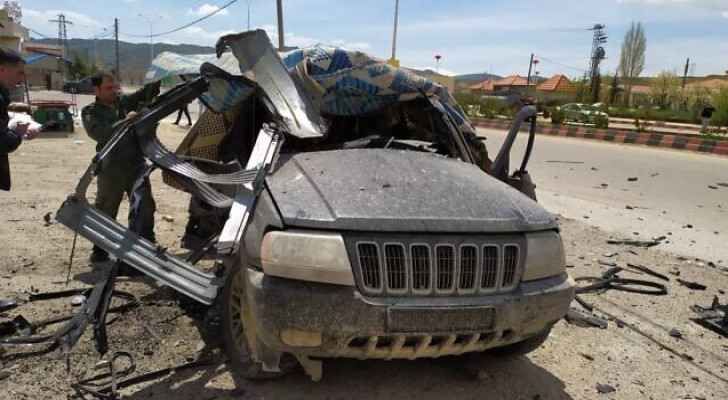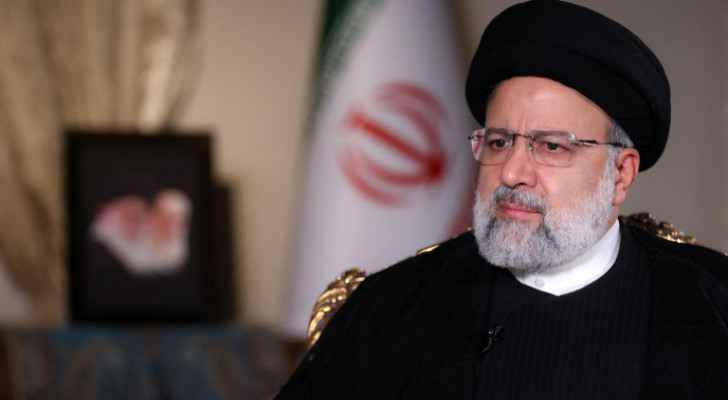Damascus Raises Flag in Daraa, but Tough Battles Ahead
AFP
The rapid fall of Daraa city, the cradle of Syria's uprising, is an important victory for President Bashar al-Assad's regime, but the country's devastating war is far from over, analysts say.
Russian-backed government forces raised the flag in Daraa city on Thursday, but the regime still has two regions outside its control -- and influential neighbors -- to contend with.
To the west, it will have to retake the Quneitra province bordering the Israeli-occupied Golan Heights, before moving on to a major battle in the north near the border with Turkey.
"Bashar al-Assad sent a signal with the fall of Daraa city that nowhere in Syria that has risen up against him will remain outside his reach," said Nick Heras, an analyst at the Center for a New American Strategy.
It was in poverty-stricken Daraa that anti-Assad protests erupted in 2011, sparking an uprising that spiraled into a complex civil war.
Seven years into the conflict, Assad's forces have sealed a deal for a handover of the city and are determined to retake the whole of the wider province of the same name on the border with Jordan.
More than 80 percent of Daraa province has returned to regime control, the Britain-based Syrian Observatory for Human Rights monitor says, but rebels are resisting in its western countryside.
- 'Special challenge' -
"All of these images from Daraa of Assad's flag flying are meant to hasten the process of negotiating deals" for these rebel holdouts, Heras said.
It is also intended to help the Assad regime retake the whole of southwest Syria, including Quneitra.
"The hope in Damascus is that the fall of Daraa will move the Israelis to a deal now to let Assad reconsolidate his rule in southwest Syria," he said.
But, says Sam Heller of the International Crisis Group think-tank, Quneitra will "represent a special military and political challenge."
The ICG said in a recent report that Israel had supported fighters in southern Syria since 2013 or 2014, apparently to "secure a buffer zone on its border."
This week, Israel said it had carried out missile strikes on Syrian military posts in Quneitra, after intercepting what it said was an unarmed drone that had strayed into its territory.
Syria geographer Fabrice Balanche said Damascus securing Quneitra and the adjacent demilitarized zone would be "difficult because a deal is needed with the Israelis."
"They are scared that the Syrian army will enter and then never leave," he said, adding the missiles strikes overnight to Thursday were likely a "warning."
Israel is particularly worried about the presence of Iranians next door in Syria, where they have been backing Assad's regime.
In recent months, a series of strikes in Syria that have killed Iranians have been attributed to Israel.
- 'Mother of all battles' -
The regime has retaken large parts of Syria with backing from its Russian ally since 2015, but few campaigns have been as quick as the one in Daraa.
A ceasefire was announced last week between opposition fighters and the regime, less than three weeks after the start of a deadly bombing campaign.
Still "it would be a mistake for the regime to let it go to its head and think that it had definitively won the war," said Karim Bitar of the Paris-based Institute of International and Strategic Affairs.
"This war in Syria is no longer exclusively Syrian, but involves many international actors who consider they have not had their last word yet."
These include not only Israel, but also foreign actors with interests in northern Syria, where analysts say Assad's regime is likely to set its sights next.
Turkey-backed rebels hold land in the north, while U.S.-supported Kurdish fighters are present in the northeast.
The northwestern province of Idlib, on the border with Turkey, is largely controlled by an alliance of jihadists and rebels led by Syria's former al-Qaida affiliate.
"Idlib, next up on Assad's list, promises to be far harder fighting for his forces, a mother of all battles," Heras said.
Turkey has taken in more than three million Syrian refugees displaced by the civil war, and is eager not to take in any more.
"Turkey has also indicated that for them they consider Idlib a red line," Heller said.
Latest News
 Jon Stewart unpacks Iran launching missiles at Israel
Jon Stewart unpacks Iran launching missiles at Israel GeorgeGalloway INTERVIEW: Iran gave one of the greatest military displays in recent history: Scott Ritter
GeorgeGalloway INTERVIEW: Iran gave one of the greatest military displays in recent history: Scott Ritter US Embassy in Jordan announces important update for non-immigrant visa applicants
US Embassy in Jordan announces important update for non-immigrant visa applicants Senior Hezbollah commander targeted in “Israeli” airstrike
Senior Hezbollah commander targeted in “Israeli” airstrike Iran threatens retaliation against any attack
Iran threatens retaliation against any attack
Most Read Articles
- JHCO dispatches 75-truck convoy of food aid to Gaza
- King from Mafraq: Jordan’s security, sovereignty above all considerations
- Senate president, Iraqi president discuss bilateral ties, regional issues
- Making emerging technologies safe for democracy - By Marietje Schaake and Steven Schuurman, The Jordan Times
- IMF ups global growth forecast but signals medium-term pessimism
- Sunak tells Netanyahu to “allow calm heads to prevail”
- UN agency finds unexploded 1,000-pound bombs in Gaza schools
- When Namibia stands up to Germany: How Gaza revolutionised the Global South - By Ramzy Baroud, The Jordan Times
- Sudanese rue shattered dreams as war enters second year
- RJAF intensifies air patrols to protect airspace